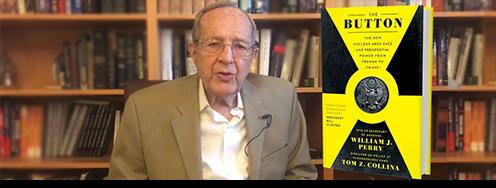The Nuclear Joke's on Us
Stop me if you’ve heard this one. A general, a professor and a lawyer walk into a Senate hearing on nuclear command and control...
By Joe Cirincione
Stop me if you’ve heard this one. A general, a professor and a lawyer walk into a Senate hearing on nuclear command and control. The senators want to know what we can do to stop a deranged president from starting a nuclear war.
The general tells them not to worry, everything is under control, but he needs more money for more weapons.
The professor tells them not to worry, everything is under control, but he’d be happy to lead a seminar on the subject.
The lawyer tells them not to worry, everything is under control and he should know because he served in the Obama administration and they didn’t change anything.
They all warn the senators to be very, very careful about tinkering with the system because the professionals in the military and executive branch know what they’re doing, they don’t make mistakes and even the slightest change could upset the gods of deterrence.
Okay, you can stop me here. Because this is no joke. This is sad. It’s why making change in Washington is so hard. It’s what happens when good, honest, patriotic Americans like the general, professor and lawyer who testified before the Senate Foreign Relations Committee on November 14 get so enmeshed in the $55 billion-a-year nuclear weapon complex that they lose all perspective.
Fortunately, the senators weren’t buying it. They, like the majority of Americans, are very worried. Senator Bob Corker (R-TN), the committee chairman who called the hearing, says that President Trump has “put us on the path to World War III” and that the White House is “an adult day care center” and that Secretary of Defense Jim Mattis and a few others “are all that stand between us and chaos.”
Secretary of State Rex Tillerson reportedly called Trump “a f***ing moron” for demanding at a private Pentagon briefing that he wants to increase our nuclear weapons arsenal many-fold, to bring it back to the peak levels of over 31,000 nuclear bombs that we had during the Cold War (up from the over 4,000 in the current active arsenal).
More recently, National Security Advisor H. R. McMaster “dismissed the president variously as an ‘idiot’ and a ‘dope’ with the intelligence of a ‘kindergartner,’” according to five sources recounting a dinner conversation McMaster had with close friends in July.
Is it any wonder that Senator Chris Murphy (D-CT) said, “We are concerned that the president of the United States is so unstable, is so volatile, has a decision-making process that is so quixotic that he might order a nuclear weapons strike that is wildly out of step with U.S. national security interests.”
“No one human being should have the power to unilaterally unleash the most destructive forces ever devised by humankind,” added Senator Ed Markey (D-MA). “Yet under existing laws, the President of the United States can start a nuclear war without provocation, without consultation, and without warning… I fear that in the Age of Trump the ‘cooler heads’ and ‘strategic doctrine’ that we once relied upon as our last, best hope against the unthinkable seem less reassuring than ever.”
Senator Jeanne Shaheen (D-NH) -- the only woman on the 21-member committee hearing from three male witnesses -- worries about Trump’s inflammatory rhetoric around nuclear weapons: “Doesn’t it also suggest it’s important for the commander in chief to also be cautious in how he talks about this issue, so there is not a miscalculation on the part of our aggressors who would do us harm about what the real intent here is?” she asked.
Questions of nuclear launch policy are front and center these days for a very good reason: most Americans are completely freaked out by Trump’s ability to order a nuclear strike whenever he wants, for whatever reason he wants.
“I must tell you, I am always amazed as to what subjects come up at town hall meetings that I hold throughout Maryland. Most of the topics deal with the local economic or domestic issues. We don’t normally get a lot of foreign policy questions at town hall meetings,” said Senator Ben Cardin (D-MD), the ranking Democrat on the committee. “But as of late I’ve been getting more and more questions about, ‘can the President really order a nuclear attack without any controls?’ That question is asked more and more by the American people.”
One would think that a hearing exploring changing the current Cold War system would have at least one witness who favored change. But this stacked deck offered the bland reassurance that “generals don’t blindly follow orders,” as Gen. Robert Kehler said. He assured the senators that he would refuse an illegal order. A statement repeated by the current commander of the Strategic Command, Gen. John Hyten at a security forum in Halifax on November 19.
But the legality of the order is a false issue. All the war plans in the binder carried in the “nuclear football” that follows the president every where he goes and is never more than one minute from his control are legal orders. They have been pre-vetted for legality. If North Korea does something provocative, the president could quickly order a legal nuclear strike. No one could stop him.
What if someone refused to carry out the order? When Gen. Kehler was asked this question by the senators, he admitted “I don’t know exactly.” Gen. Hyten had a more elaborate answer:
“He'll tell me what to do, and if it's illegal, guess what's going to happen? I'm gonna say, 'Mr. President, that's illegal.' Guess what he's going to do? He's going to say, 'What would be legal?' And we'll come up with options of a mix of capabilities to respond to whatever the situation is, and that's the way it works. It's not that complicated."
In other words, the general would come up with a way to make a nuclear strike “legal.” That is, if he were still around. Just as likely, the president would remove the general and get someone who would execute his order. Trump would burn through the general’s resistance like tissue paper. Or, as nuclear expert Bruce Blair told the Associated Press, the president could bypass the Strategic Command completely and send his order directly to the Pentagon and on to the missile silos.
This problem does not originate with Trump, but with the nuclear launch policy itself. At an October Ploughshares Fund conference, Senator Dianne Feinstein (D-CA) recounted a conversation she had with the head of Strategic Command during the Obama administration: “I said to him, if you were asked by the president to launch and you really believed it was the wrong thing, would you do it anyway? And he looked me right in the eye and said ‘Yes.’ … The total authority is within the office of the presidency, and particularly in one man: the President of the United States.”
Congress is not accepting the condescending reassurances offered so far. Sen. Ed Markey and Rep. Ted Lieu have a bill gaining momentum in Congress to require Congressional approval before any president starts a nuclear war. You know, the power vested in Congress and Congress alone by the Constitution. There are over 73 co-sponsors so far in the House and over 13 in the Senate, including Senators Elizabeth Warren, Chris Van Hollen, Dianne Feinstein and Kirsten Gillibrand.
Rep. Adam Smith (D-WA), the ranking member of the House Armed Services Committee introduced more sweeping legislation last week. It is one sentence long: “It is the policy of the United States to not use nuclear weapons first.”
“We have prevented the use of nuclear weapons in war for 72 years,” says Smith. “We must continue working to ensure they will not be employed by taking steps to increase strategic stability, stem the incentives for nuclear proliferation and reduce the likelihood that these weapons will be used irresponsibly in a conflict."
This is a step that the Obama Administration considered in 2009. But they backed down in the face of resistance from the nuclear bureaucracy. If they had established the policy when they had the chance, we wouldn’t be having this debate now: any order to use nuclear weapons first would be illegal and the military would be duty-bound to refuse it.
This should be a lesson we can all learn: The next time we get a real chance to fix our obsolete nuclear policy, we’d better take it. You never know when you’re going to draw the Joker from the pack.
--Joe Cirincione is president of Ploughshares Fund and the author of Nuclear Nightmares: Securing the World Before It Is Too Late.
More resources:
--“The Most Dangerous Man in the World” by Tom Collina for Defense One here.
--“The Senate Questions the President’s Power to Launch Nukes” by The New York Times’s Editorial Board here.
--“Trump era sparks new debate about nuclear war authority” by Robert Burns for The Washington Post here.
--“Trump's Nuclear Authority Reviewed on Capitol Hill” by Michael Bowman for VOA News here.
--“Senate committee questions Trump's nuclear authority” by Patricia Zengerle for Reuters here.
--“Nuclear Weapons Authority” for C-SPAN here.
--“Trump can't start a nuclear war by himself, but there's not much stopping him” by Sean Illing for Vox here.



